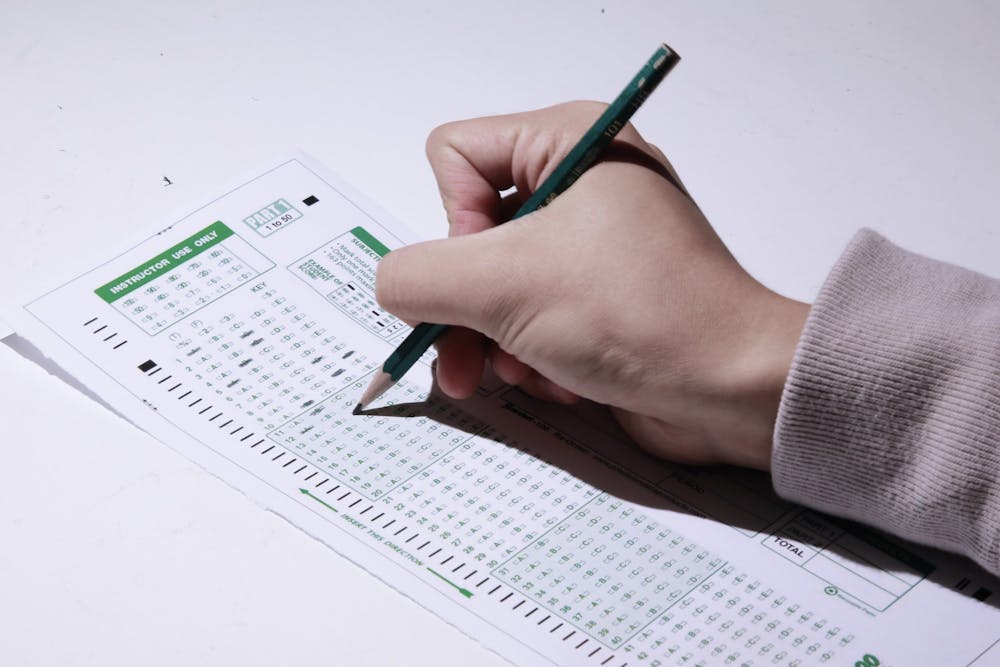More students than ever will apply to college without taking standardized entrance exams this cycle, creating more uncertainty for higher education institutions and applicants during an already tumultuous year.
Penn announced back in June that it is no longer requiring SAT and ACT test scores for applicants in the 2020-2021 admissions cycle, because the pandemic prevented millions of students from taking the exams. Dean of Admissions Eric Furda said other aspects of students' applications – transcripts, essays, recommendation letters, interviews, and other supplementary information – will now weigh more heavily in the admissions process due to the lack of test scores.
“We're going to be missing something that we're accustomed to, which means that we're going to need to lean on other parts of the application that are still there – whether it's the academic record up to this point or the extracurricular record up to this point,” he said.
All eight Ivy League schools are now completely test-optional this year. Four of Cornell University's eight undergraduate schools, including its Hotel and Business schools, will be completely test-free and not consider standardized tests in applications at all.
Despite the pandemic, Dean Furda remains hopeful that this year’s high school seniors will have ample materials from their early high school years to help officers make informed decisions.
“For both academics and extracurricular activities, at least for this year’s senior class, it's not like they don't have a record of their freshman year, sophomore year, and three-quarters of their junior year,” he said. “There’s still a transcript for close to three years.”
Students who do not submit SAT, ACT, or SAT Subject Tests for the 2020-2021 application cycle will not be at a disadvantage in the admissions process, according to the Penn Admissions website. However, the admissions office will continue to accept and evaluate scores of applicants who were able to take the tests.
The policy raises questions about what “test-optional” truly means for prospective students' applications. While most colleges assure students that they will not be at a disadvantage if they do not submit test scores, some college counseling specialists question the assertion.
RELATED:
Students chafe at Gutmann’s $3.6 million salary as Penn’s academics face cuts
Penn closed its campus for the fall. Dozens of first years came to Philadelphia anyway.

Brian Taylor, who is the managing director of Ivy Coach, a firm that help students gain admission to selective colleges, suspects that students who do submit test scores will receive an immense advantage in the process.
“We don't believe test-optional policies are worth the paper they're written on,” Taylor said. “If one kid has great test scores and one kid has no test scores, all else being equal, the kid with great test scores will win every time over the kid with no test scores. As long as the school allows the submission of the scores, then they're not telling it like it is. They're not really test-optional.”
Taylor urges students to do whatever it takes to submit scores despite the cancellation of several SAT and ACT tests this year. Though he recognizes that most top institutions will have to admit applicants without test scores, he would not recommend that prospective applicants take that chance.
“If your school is not offering an SAT or an ACT, take it in a neighboring school. Drive three states. Drive to Nebraska,” he said. “Get an N-95 mask, grab a pair of gloves and two number two pencils, and drive and take an SAT or ACT.”
However, some schools are finding ways to offer students tests despite SAT and ACT cancellations.
President of One-Stop College Counseling and 1986 Wharton graduate Laurie Kopp Weingarten said some high schools have chosen to administer their own SAT or ACT exams this year. However, she stressed that private high schools offer these tests much more than public schools.
With scarce testing options and universities running deficits, Weingarten expressed concerns that this year's application cycle will especially favor applicants from higher income families. She said she feels universities may need to depend more heavily on early decision applicants – as well as students who are able to pay full tuition – because they are more likely to matriculate.
“What I’ve seen written is that the opinion of many is that this year is going to favor the haves over the have nots,” she said. "I think it depends on the school. It depends on what kind of financial situation they're in, and what's been going on. Most schools have really taken a huge hit, but some have a little bit more reserved enough to cover it than others."
Yet Penn has not yet taken a dire financial hit from the coronavirus. This year Penn's endowment increased by $200 million and the financial aid budget increased by $35 million. With these factors in mind, Dean Furda emphasized that this application cycle will take an even more holistic approach than usual, especially taking into account whether students had the opportunity to take or retake standardized tests.
Furda also said the Office of Admissions will try to be sensitive to students' situations on a case-by-case basis. He also referenced the fact that the common application has a space separate from the basic essay to write about how they were affected by the coronavirus.
“You always hear us use the word context. We need to make sure that we understand where the students and their experiences have been, and we'll be sensitive to that," Dean Furda explained. "But, you know, we still have the reality that we’ll receive tens of thousands of applications for a limited number of spots. So we need to look at how all these different pieces to fit together, in a comprehensive and whole person review, and have some pretty deep discussions.”









